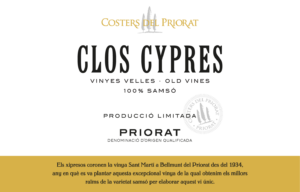Costers del Priorat Clos Cypres Priorat 2019
Costers del Priorat Clos Cypres Priorat 2019
Jose Mas Barberá and his Costers del Priorat is a leading voice in the evolution of the wines of Priorat, producing distinctive wines rooted in the terroir of the Catalan countryside. The wines of Costers del Priorat emphasize nuance and elegance over power, a philosophical departure from the strong, tannic wines that once defined the region.
Jose’s work in very privileged old vineyards in nine out of the twelve villages of Priorat allows him to focus on the different terroirs of Priorat, but with a unique twist. The majority of his plantings are carignan-based, and this includes his two most important sites, Mas Alsera and Sant Martí. All his limited production wines are classified as Vielles Vinyes (old vines), a designation that uses US WWII aerial maps to certify vineyards that are over 75 years old or planted before 1945.
Jose achieves this elegance by employing only organic farming methods, allowing the wines to guide their evolution without ever forcing their trajectory and utilizing a gentle élevage tailored to each vineyard.
In the southern Priorat village of Bellmunt, Clos Cypres is an organically-farmed, west-facing samsó (carignan) vineyard at 300m to 375m, planted in 1934 at the historic Finca Sant Martí. The oldest part of this vineyard was named Clos Cypres for the ancient cypress trees which stand sentinel over the adjacent graveyard. The carignan wines of Bellmunt transmit the luminosity and warmth of the Mediterranean; they are soft and generous with developed tannins and a cool minerality from the trademark red slate llicorella soils. Comparisons can be made with the Brunate cru from La Morra in Barolo for a similar combination of generous fruit expression and structured backbone that fruit from Clos Cypres shows. Clos Cypres is a limited 100% samsó (carignan) Vi de Paratge bottling, built to improve with additional time in bottle. Wines are made with low intervention and minimal sulfur at bottling.
Vinification – After a manual harvest, the indigenous yeast fermentation occurs in 500L French barrels, with subsequent 40-day maceration and spontaneous malolactic fermentation. The wine is then aged for 12 months in the same vessels.


